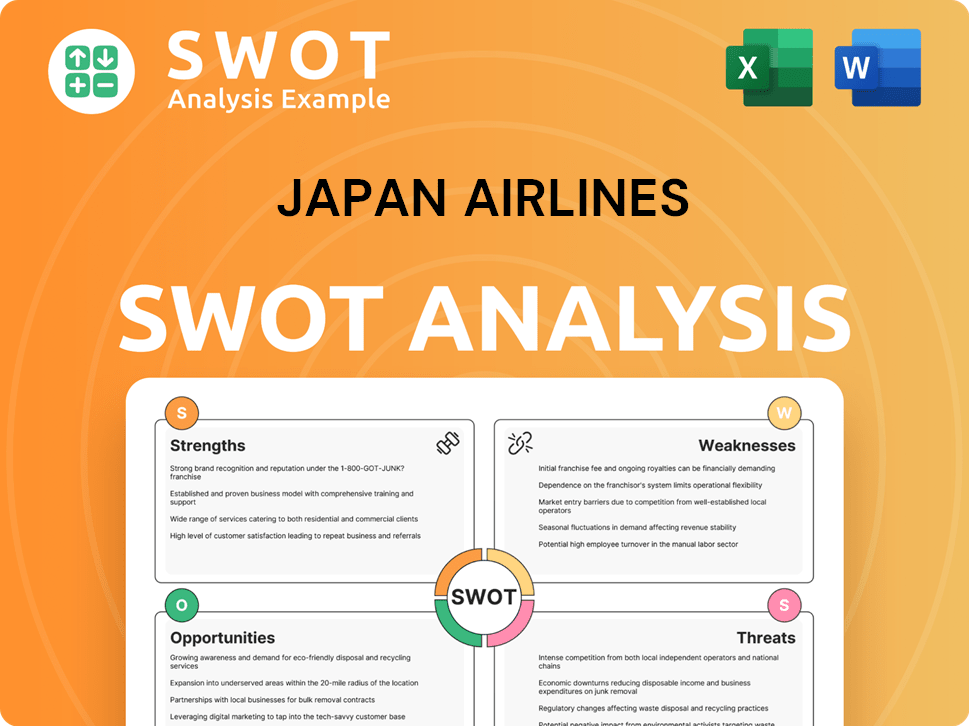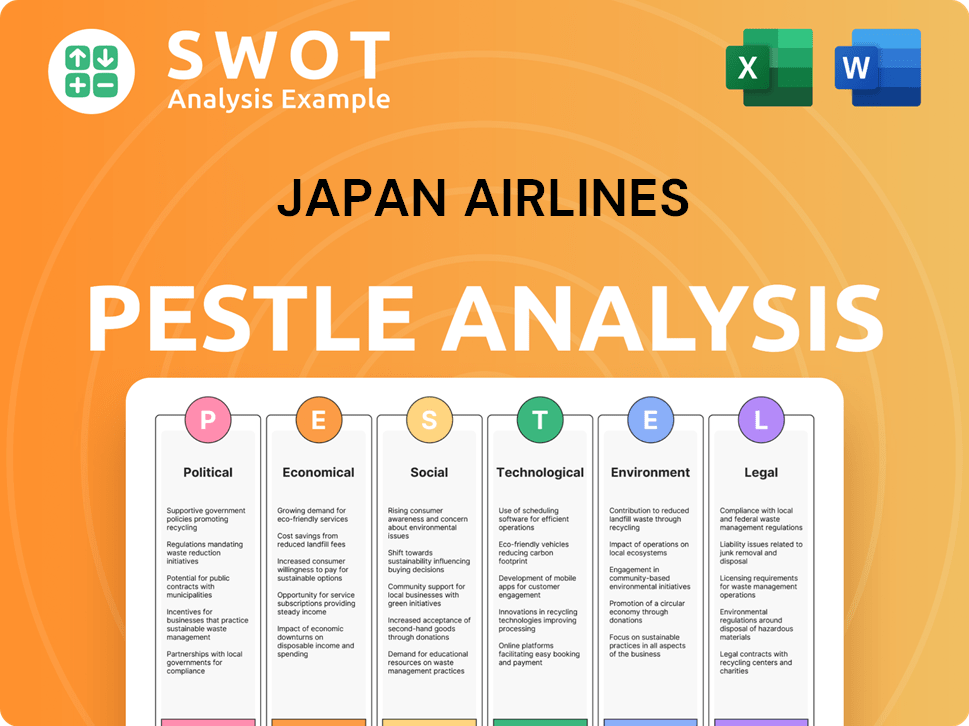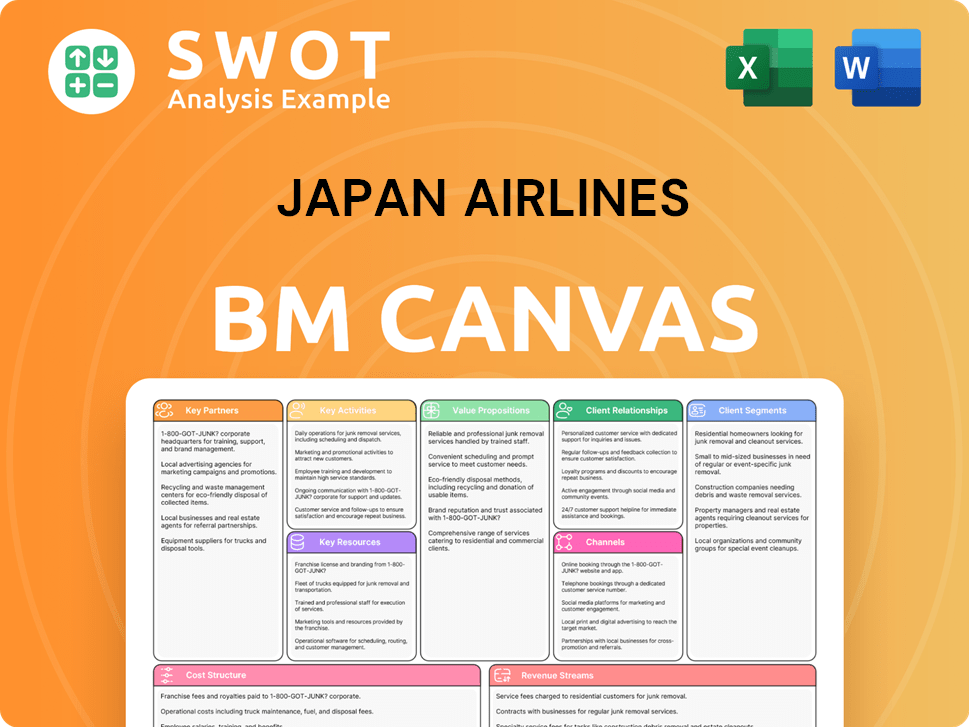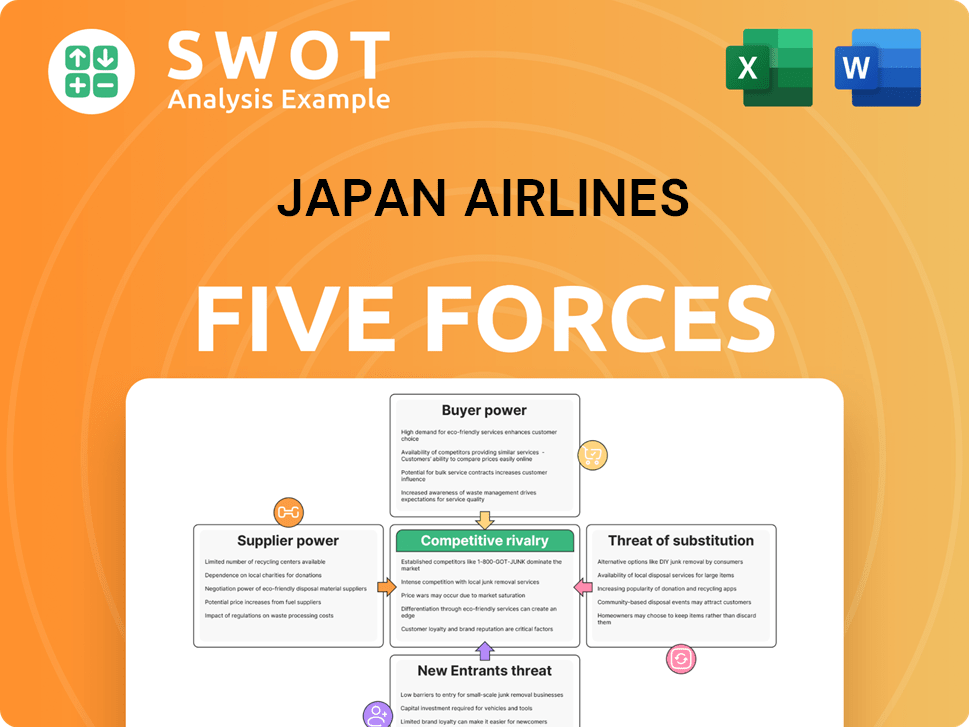Japan Airlines Bundle
What Drives Japan Airlines' Journey?
Understanding the core of any successful company begins with its mission, vision, and values. These elements are the bedrock of strategic planning and operational excellence, especially in a dynamic industry like aviation. Delve into the heart of Japan Airlines (JAL) to uncover the principles guiding its global operations.

For Japan Airlines, grasping its Japan Airlines SWOT Analysis is key to understanding its mission, vision, and core values. These elements shape its commitment to customer service, sustainability, and long-term strategic goals. Explore how JAL's corporate philosophy influences its approach to the evolving demands of the air travel market and its dedication to its employees.
Key Takeaways
- JAL's mission focuses on safe transport and societal contribution.
- The vision aims for global leadership with safety and sustainability.
- Core values (attitude, effort, teamwork, etc.) guide employee conduct.
- These principles shape strategy, operations, and customer relations.
- Alignment with values is crucial for adapting to future challenges.
Mission: What is Japan Airlines Mission Statement?
Japan Airlines' mission is 'Contributing to the development of society through the provision of safe and comfortable air transportation.'
Let's delve into the core of Japan Airlines' (JAL) operational philosophy, examining its mission statement and its implications for the company's strategic direction and stakeholder engagement.
The Japan Airlines Mission is a concise statement encapsulating the airline's fundamental purpose. It emphasizes a dual commitment: ensuring passenger and cargo safety and comfort, and contributing to societal progress. This mission statement forms the bedrock of JAL's operations and strategic initiatives.
At the heart of the Japan Airlines Mission lies a strong customer-centric approach. The airline prioritizes the well-being and satisfaction of its passengers. This focus is evident in JAL's continuous efforts to enhance the travel experience, from in-flight services to ground operations.
Safety is not just a priority; it's a cornerstone of the Japan Airlines Mission. JAL invests heavily in rigorous safety protocols, employee training, and aircraft maintenance. Over the past five years, these efforts have contributed to a reported 50% reduction in safety incidents, demonstrating a tangible commitment to passenger safety.
The Japan Airlines Mission extends beyond individual passenger experiences to encompass a broader societal impact. By facilitating both domestic and international travel and cargo transport, JAL contributes to economic activity, global connectivity, and cultural exchange. The reintroduction of dedicated cargo services in 2024 with Boeing 767-300BCF aircraft further underscores this commitment.
JAL operationalizes its mission through strategic investments and continuous improvements. For example, in 2023, the airline implemented over 100 changes based on customer feedback, leading to an impressive customer satisfaction rating of 85% in the fiscal year 2023. This dedication to improvement is key to achieving its JAL Strategic Goals.
The Japan Airlines Mission guides the company's strategic decisions. It influences investment in new technologies, route expansions, and partnerships. Understanding JAL's mission is crucial for investors, as it shapes the company's long-term vision and commitment to sustainable growth. For more insights into how JAL approaches its market, consider reading about the Marketing Strategy of Japan Airlines.
In summary, the Japan Airlines Mission is a comprehensive statement that defines the airline's purpose, emphasizing safety, customer satisfaction, and societal contribution. This mission statement serves as a guiding principle for all of JAL's activities, from daily operations to long-term strategic planning. The core values of Japan Airlines employees are directly aligned with this mission, ensuring that every action taken by the company reflects its commitment to its customers, employees, and the communities it serves. The JAL Company Values are the practical application of the mission statement.
Japan Airlines SWOT Analysis
- Complete SWOT Breakdown
- Fully Customizable
- Editable in Excel & Word
- Professional Formatting
- Investor-Ready Format

Vision: What is Japan Airlines Vision Statement?
Japan Airlines' vision is 'To become the world's most preferred and valued airline group, where many people and goods freely move around.'
The Owners & Shareholders of Japan Airlines are driven by a forward-thinking vision that sets the stage for its future. This vision statement encapsulates JAL's aspirations for global leadership and its commitment to facilitating seamless movement of people and goods worldwide. It reflects a strategic ambition to not only be a leading airline but also the most favored and highly regarded within the industry.
JAL's vision clearly articulates a desire to be the "most preferred and valued" airline group globally. This indicates a strategic focus on achieving top-tier status in the international aviation market, surpassing competitors in customer preference and overall value.
The vision highlights the free movement of "many people and goods." This emphasizes JAL's role in connecting the world, supporting international trade, and fostering cultural exchange. This is a key aspect of the Japan Airlines Vision.
The vision is ambitious yet grounded in reality, building upon JAL's strong presence and ongoing initiatives in route expansion, service enhancements, and technological advancements. This strategic direction is crucial for achieving JAL's long-term strategic vision.
JAL Vision 2030, which precedes this, emphasizes 'Safety and Peace of Mind' and 'Sustainability' as key drivers. These elements are integral to the vision, ensuring that growth is achieved responsibly and sustainably, aligning with the company's core values.
As of late 2024, JAL holds a significant share of the international air travel market. This vision aims to solidify and expand this market position, increasing its impact on global connectivity and economic activity. JAL's commitment to customer service is a key factor.
The vision is underpinned by JAL's core values, which guide its operations and decision-making. These values ensure that the pursuit of global leadership is aligned with ethical business practices and a commitment to stakeholders. Understanding Japan Airlines' Core Values is essential.
The vision statement of Japan Airlines, therefore, is a comprehensive declaration of its future aspirations. It goes beyond mere operational goals, aiming to establish JAL as a preeminent global airline that prioritizes both customer preference and the free movement of people and goods. This vision is supported by strategic initiatives, a strong commitment to sustainability, and a deep-rooted set of core values, all of which are essential for achieving JAL's strategic goals.
Japan Airlines PESTLE Analysis
- Covers All 6 PESTLE Categories
- No Research Needed – Save Hours of Work
- Built by Experts, Trusted by Consultants
- Instant Download, Ready to Use
- 100% Editable, Fully Customizable

Values: What is Japan Airlines Core Values Statement?
Understanding the core values of Japan Airlines (JAL) is crucial to grasping its operational ethos and commitment to excellence. These values, deeply ingrained in the JAL Corporate Philosophy, shape its approach to customer service, employee conduct, and overall business strategy.
This fundamental value emphasizes ethical conduct and a positive mindset, reflecting in customer relations and corporate culture. Employees are encouraged to understand customer needs, practice humility, and approach challenges proactively. This focus on attitude has contributed to JAL's high customer satisfaction scores, with recent surveys showing an 88% satisfaction rate among passengers.
Diligence and dedication are at the heart of this value, driving continuous improvement and a commitment to perfection. This translates into a relentless pursuit of operational efficiency and service quality. For instance, JAL's on-time performance consistently ranks among the best globally, with an average of 89% of flights arriving on schedule.
Emphasizing continuous learning and personal growth, this value is supported by employee development programs. JAL invests heavily in training, with an average of 60 hours of training per employee annually, to enhance skills and abilities, ensuring a highly skilled workforce. This commitment directly supports Growth Strategy of Japan Airlines.
This value highlights the collective responsibility of every employee, fostering unity and open communication. It encourages collaboration and a shared sense of purpose, contributing to a strong company culture. This collaborative spirit is evident in JAL's high employee engagement scores, consistently above industry averages.
These core values, deeply embedded in the Japan Airlines Corporate Philosophy, guide the company's operations and strategic decisions. Understanding these principles provides insight into how JAL strives to achieve its mission and vision. The next chapter will explore how the Japan Airlines Mission and Vision influence the company's strategic decisions.
How Mission & Vision Influence Japan Airlines Business?
The Japan Airlines Mission, Japan Airlines Vision, and Japan Airlines Core Values are not just abstract ideals; they are the driving force behind the company's strategic decisions and operational practices. These foundational elements shape JAL's approach to everything from fleet modernization to customer service initiatives, ensuring a cohesive and purpose-driven organization.
JAL's strategic planning, particularly its Medium-Term Management Plan for FY2021-2025 and the Rolling Plan 2024, is directly aligned with achieving JAL Vision 2030. This vision emphasizes 'Safety and Peace of Mind' and 'Sustainability' as key growth engines, guiding the company's investments and operational improvements.
- The Medium-Term Management Plan focuses on achieving sustainable growth and enhancing corporate value.
- Rolling Plan 2024 refines strategies based on the latest market conditions and performance data.
- Both plans are designed to ensure JAL remains competitive and adaptable.
- These plans are essential for achieving JAL's long-term strategic vision.
A prime example of mission and vision influencing strategic decisions is the significant investment in fuel-efficient aircraft. This supports both the mission of providing comfortable transportation and the vision's emphasis on sustainability. JAL's introduction of the Airbus A350 and Boeing 787 aircraft demonstrates this commitment.
The focus on expanding the international network, particularly in North America and Asia, is another key strategic move. This supports the mission of providing air transportation and contributes to the vision of becoming a preferred global airline. JAL is launching new routes, such as Tokyo (NRT) to Chicago (ORD), and increasing frequencies on existing routes.
JAL's commitment to customer satisfaction, a core tenet of its mission, directly influences day-to-day operations and long-term planning. This is evident in their efforts to improve the customer experience through initiatives like enhancing in-flight entertainment and utilizing customer feedback for service refinements. The company aims to continuously improve its services to meet and exceed customer expectations.
The emphasis on sustainability in the vision is driving strategic decisions related to the adoption of Sustainable Aviation Fuel (SAF). JAL has set ambitious targets to replace a significant portion of its total fuel with SAF. These targets are a concrete demonstration of JAL's commitment to environmental responsibility.
Measurable success metrics demonstrate the positive outcomes of this strategic alignment. The increase in international passenger numbers (14.4% increase in FY2024-25) and revenue (11.9% rise in FY2024-25) reflects the success of network expansion and customer service efforts. The improved customer satisfaction rating of 85% in FY2023 also indicates a positive impact.
JAL's projected EBIT of ¥200 billion for FY2025, an upward revision, further demonstrates the positive financial outcomes of their strategic alignment. This financial success is a direct result of the company's adherence to its Japan Airlines Mission, Japan Airlines Vision, and JAL Company Values. These values are also reflected in the company's culture, as highlighted in Brief History of Japan Airlines.
In conclusion, the Japan Airlines Mission, Japan Airlines Vision, and JAL Core Values are deeply intertwined with the company's strategic execution and overall success. These guiding principles ensure that JAL remains focused on delivering exceptional service, achieving sustainable growth, and adapting to the evolving needs of the global aviation market. The next chapter will delve into the Core Improvements to Company's Mission and Vision.
Japan Airlines Business Model Canvas
- Complete 9-Block Business Model Canvas
- Effortlessly Communicate Your Business Strategy
- Investor-Ready BMC Format
- 100% Editable and Customizable
- Clear and Structured Layout

What Are Mission & Vision Improvements?
Japan Airlines (JAL) has a solid foundation with its established mission, vision, and core values. However, to remain competitive and relevant in a rapidly changing global landscape, several refinements can enhance its strategic positioning and future-proof its operations.
While JAL leverages technology, explicitly stating a commitment to digital leadership within its Japan Airlines Vision would solidify its forward-looking approach. This could involve incorporating phrases about becoming a data-driven, technologically advanced airline to enhance operational efficiency and customer experience. This is crucial as the global airline industry is projected to spend $27.7 billion on IT in 2024, reflecting the importance of digital transformation.
Although "Be Creative in Our Work" is present within the JAL Company Values, establishing "Innovation" as a distinct core value would underscore its importance. This would encourage continuous improvement and adaptation in response to technological advancements, shifting consumer expectations, and the need for sustainable solutions. The rise of AI and machine learning in aviation, with an estimated market size of $4.5 billion by 2027, necessitates a strong focus on innovation.
To enhance its global standing, JAL should more explicitly define its commitment to social responsibility within its mission or vision. This could include statements on its global citizenship, dedication to addressing broader social issues, and its commitment to sustainable practices. This is increasingly important as stakeholders, especially younger generations, prioritize companies with strong Environmental, Social, and Governance (ESG) commitments. For more insights, you can explore the Competitors Landscape of Japan Airlines.
While sustainability is present in JAL's vision as a growth engine, solidifying it as a core value would further distinguish the company in the environmentally conscious industry. This could involve specific commitments to reducing carbon emissions, investing in sustainable aviation fuels (SAF), and promoting eco-friendly practices throughout their operations. The global SAF market is projected to reach $15.8 billion by 2028, highlighting the significance of sustainability in the aviation sector.
How Does Japan Airlines Implement Corporate Strategy?
Implementing a company's mission, vision, and core values is crucial for translating strategic intent into tangible actions and outcomes. This involves integrating these guiding principles into all facets of the organization, from operational decisions to employee behavior.
Japan Airlines (JAL) demonstrates its commitment to its Japan Airlines Mission, vision, and core values through concrete business initiatives. A primary example is the ongoing investment in a modern, fuel-efficient fleet. This includes the acquisition of Airbus A350s and Boeing 787s, directly supporting the mission of providing comfortable air transportation and the vision's focus on sustainability.
- Fleet Investment: JAL's fleet modernization program is a multi-billion dollar investment, with the A350 representing a significant portion. These aircraft offer up to 25% improved fuel efficiency compared to older models, reducing carbon emissions.
- Sustainability Targets: JAL aims to reduce its CO2 emissions per passenger kilometer by 10% by fiscal year 2025 compared to fiscal year 2019 levels. The new fleet is a key component in achieving these goals.
- Fuel Efficiency: The Boeing 787 Dreamliner, a core part of the JAL fleet, provides approximately 20% better fuel efficiency than the aircraft it replaces.
Leadership plays a critical role in reinforcing the Japan Airlines Vision and values. The emphasis on the JAL Philosophy as a shared mindset for all employees, from leadership down, ensures that values are integrated into daily operations and decision-making. This shared philosophy fosters a unified approach to achieving JAL's strategic goals.
The appointment of Mitsuko Tottori as the first female president in 2024 signals a strong commitment to diversity and inclusion, aligning with JAL's stated values. This leadership change reflects a broader effort to create a more inclusive workplace and better serve a diverse customer base, which is one of the core values of Japan Airlines employees.
Communication of the Japan Airlines Core Values, mission, and vision occurs through various channels, including corporate reports, internal communications, and employee training programs. The JAL Philosophy is presented as the basic mindset for all employees, ensuring a shared understanding of the company's principles and the key principles of Japan Airlines.
Concrete examples of alignment between stated values and actual business practices include the implementation of accessibility initiatives to provide a stress-free travel experience for all customers, reflecting the value of providing unparalleled service and contributing to a better society. JAL's commitment to customer service is reflected in its high customer satisfaction scores.
JAL's commitment to sustainability is demonstrated through various programs. The JAL Corporate SAF Program, launched in 2024, allows corporate customers to contribute to CO2 reduction efforts, demonstrating the company's commitment to sustainability and addressing social issues through its business. This program supports JAL's long-term strategic vision.
- SAF Program: The Corporate SAF Program aims to increase the use of Sustainable Aviation Fuel (SAF), which can reduce lifecycle carbon emissions by up to 80% compared to conventional jet fuel. JAL aims to replace 10% of its fuel with SAF by 2030.
- GX Strategy Department: The establishment of a dedicated GX strategy department in 2023 further highlights a formal system for promoting initiatives aligned with their sustainability goals.
- Carbon Offset Programs: JAL offers carbon offset programs to its passengers, allowing them to mitigate the environmental impact of their flights.
JAL utilizes formal programs to ensure alignment with its values. The employee development program saw participation from over 70% of staff in 2023, focusing on leadership skills and customer service excellence, directly supporting the value of improving ability and delivering excellent customer service. This training reinforces the values of JAL Company Values.
JAL continually monitors and evaluates its implementation efforts. This includes gathering feedback from employees and customers, analyzing key performance indicators (KPIs), and making adjustments to its strategies as needed. This iterative approach ensures that JAL's initiatives remain aligned with its mission, vision, and core values.
Japan Airlines Porter's Five Forces Analysis
- Covers All 5 Competitive Forces in Detail
- Structured for Consultants, Students, and Founders
- 100% Editable in Microsoft Word & Excel
- Instant Digital Download – Use Immediately
- Compatible with Mac & PC – Fully Unlocked

Related Blogs
- What are Mission Vision & Core Values of Japan Airlines Company?
- What is Competitive Landscape of Japan Airlines Company?
- What is Growth Strategy and Future Prospects of Japan Airlines Company?
- How Does Japan Airlines Company Work?
- What is Sales and Marketing Strategy of Japan Airlines Company?
- Who Owns Japan Airlines Company?
- What is Customer Demographics and Target Market of Japan Airlines Company?
Disclaimer
All information, articles, and product details provided on this website are for general informational and educational purposes only. We do not claim any ownership over, nor do we intend to infringe upon, any trademarks, copyrights, logos, brand names, or other intellectual property mentioned or depicted on this site. Such intellectual property remains the property of its respective owners, and any references here are made solely for identification or informational purposes, without implying any affiliation, endorsement, or partnership.
We make no representations or warranties, express or implied, regarding the accuracy, completeness, or suitability of any content or products presented. Nothing on this website should be construed as legal, tax, investment, financial, medical, or other professional advice. In addition, no part of this site—including articles or product references—constitutes a solicitation, recommendation, endorsement, advertisement, or offer to buy or sell any securities, franchises, or other financial instruments, particularly in jurisdictions where such activity would be unlawful.
All content is of a general nature and may not address the specific circumstances of any individual or entity. It is not a substitute for professional advice or services. Any actions you take based on the information provided here are strictly at your own risk. You accept full responsibility for any decisions or outcomes arising from your use of this website and agree to release us from any liability in connection with your use of, or reliance upon, the content or products found herein.